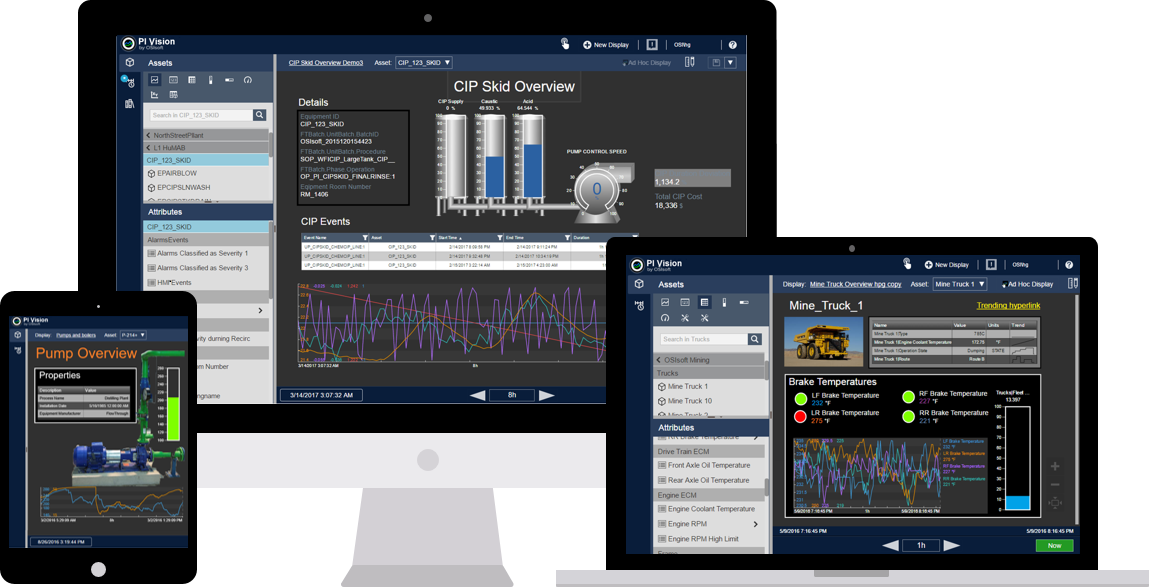1. EXECUTIVE SUMMARY
- CVSS v3 7.7
- ATTENTION: Exploitable remotely/low skill level to exploit
- Vendor: OSIsoft
- Equipment: PI Vision 2020
- Vulnerabilities: Cross-site Scripting, Incorrect Authorization
2. RISK EVALUATION
Successful exploitation of these vulnerabilities may allow a remote attacker with write access to the PI ProcessBook files to inject code that is imported into PI Vision, or disclose information to a user with insufficient privileges.
3. TECHNICAL DETAILS
3.1 AFFECTED PRODUCTS
All versions prior to PI Vision 2020 are affected.
3.2 VULNERABILITY OVERVIEW
3.2.1 IMPROPER NEUTRALIZATION OF INPUT DURING WEB PAGE GENERATION (‘CROSS-SITE SCRIPTING’) CWE-79
A remote attacker with write access to PI ProcessBook files could inject code that is imported into PI Vision. Unauthorized information disclosure, modification, or deletion is also possible if a victim views or interacts with the infected display. This vulnerability affects PI System data and other data accessible with victim’s user permissions.
CVE-2020-25163 has been assigned to this vulnerability. A CVSS v3 base score of 7.7 has been assigned; the CVSS vector string is (AV:N/AC:H/PR:L/UI:R/S:C/C:H/I:H/A:N).
3.2.2 INCORRECT AUTHORIZATION CWE-863
PI Vision could disclose information to a user with insufficient privileges for an AF attribute.
CVE-2020-25167 has been assigned to this vulnerability. A CVSS v3 base score of 4.9 has been assigned; the CVSS vector string is (AV:N/AC:L/PR:H/UI:N/S:U/C:H/I:N/A:N).
3.3 BACKGROUND
- CRITICAL INFRASTRUCTURE SECTORS: Multiple
- COUNTRIES/AREAS DEPLOYED: Worldwide
- COMPANY HEADQUARTERS LOCATION: United States
3.4 RESEARCHER
OSIsoft reported these vulnerabilities to CISA.
4. MITIGATIONS
OSIsoft released PI Vision 2020 Version 3.5.0, which resolves these vulnerabilities.
Recommended defensive measures and related configuration settings are described on the OSIsoft customer portal (Login required).
CISA recommends users take defensive measures to minimize the risk of exploitation of this vulnerability. Specifically, users should:
- Minimize network exposure for all control system devices and/or systems, and ensure that they are not accessible from the Internet.
- Locate control system networks and remote devices behind firewalls, and isolate them from the business network.
- When remote access is required, use secure methods, such as Virtual Private Networks (VPNs), recognizing that VPNs may have vulnerabilities and should be updated to the most current version available. Also recognize that VPN is only as secure as the connected devices.
CISA reminds organizations to perform proper impact analysis and risk assessment prior to deploying defensive measures.
CISA also provides a section for control systems security recommended practices on the ICS webpage on us-cert.cisa.gov. Several recommended practices are available for reading and download, including Improving Industrial Control Systems Cybersecurity with Defense-in-Depth Strategies.
Additional mitigation guidance and recommended practices are publicly available on the ICS webpage on us-cert.cisa.gov in the Technical Information Paper, ICS-TIP-12-146-01B–Targeted Cyber Intrusion Detection and Mitigation Strategies.
Organizations observing any suspected malicious activity should follow their established internal procedures and report their findings to CISA for tracking and correlation against other incidents.
CISA also recommends users take the following measures to protect themselves from social engineering attacks:
- Do not click web links or open unsolicited attachments in email messages.
- Refer to Recognizing and Avoiding Email Scams for more information on avoiding email scams.
- Refer to Avoiding Social Engineering and Phishing Attacks for more information on social engineering attacks.
No known public exploits specifically target these vulnerabilities.
Source:


Stay connected